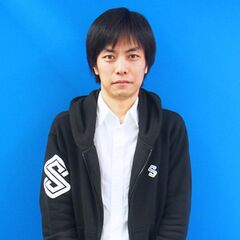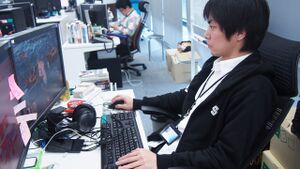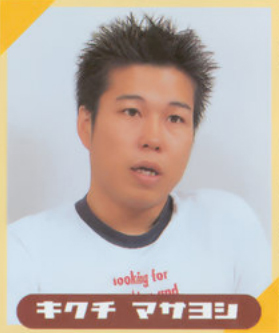Tadashi Okuda
From Sega Retro

|
| Tadashi Okuda |
|---|
| Employment history: Smilebit (2002 – 2003)
Amusement Vision (2003 – 2004)
Sega (2004 – 2012)
Divisions:
Sega Networks (2012 – 2015)
Sega Games[1] (2015 – )
|
| Role(s): Designer, Director |
Tadashi Okuda (奥田 禎) is a game designer and director at Sega of Japan. While at university, he worked as a part-time game designer on Jet Set Radio Future, and since joining Sega, has continued to work with that game's director Masayoshi Kikuchi on the earlier Yakuza games and various mobile games thereafter as a director, most notably War Pirates: Heroes of the Sea.
Contents
Early life
In his first grade of elementary school, Tadashi Okuda lived in the Soviet Union for roughly a year and a half, because his father worked there. He had little access to games there, but brought a few portable games over from Japan, namely Nintendo's Game & Watch titles Octopus and Fire. He also brought with him the manga Kinnikuman, and these items became formative to his childhood. 6 months after returning to Japan, he played the game Tennis for the Nintendo Famicom at a friend's house and begged his parents to buy him a Famicom of his own, with Xevious becoming a standout game to play[1].
Career
Console games
Tadashi Okuda began working for Sega in Autumn of 2001, taking a part-time job offer while still at university. He wanted to work on console games, so began working for Smilebit, a subsidiary of Sega's which was developing franchises such as Let's Make Baseball, Let's Make Soccer and Panzer Dragoon. The game Okuda worked on with his free time was the action game Jet Set Radio Future. He did fairly menial object placement work, placing spray cans, enemies and obstacles throughout the levels. He had planned to see development through to the end, but was forced to quit development to finish writing his thesis, one week ahead of its deadline, as he wouldn't be able to graduate without doing it[1].
After completing the new employee training early in 2002, Okuda's first full-time project at Smilebit was the 3D rail shooter Panzer Dragoon Orta, which did not have enough designers on board to balance the game and create levels. Okuda finalized several stage designs, such as the enemies in level 3 and alternate routes[1].
In 2003, various staff from Smilebit were moved to another subsidiary, Amusement Vision, including Okuda and Masayoshi Kikuchi (director of Jet Set Radio Future). There, they began working on a new IP, Yakuza, released 2 years later, after the subsidiary was restructured as a Sega development department named New Entertainment R&D Dept.. Okuda's role for this first game was to design some enemies and assign the activation conditions for the series' signature Heat Actions, special moves which can be used when a meter is filled up. As the Yakuza series progressed over the next 3 installments, Okuda's responsibilities grew to encompass enemies, bosses and battle stages. He became the battle game design lead for Yakuza 4, which required focusing on the unique battle aspects of the game's 4 playable characters, including their action and leveling systems[1].
Okuda filled mostly the same position on Yakuza 5 as he did Yakuza 4, but left development mid-way through[1], coinciding with the founding of Sega Networks.
Mobile games
At some point, Masayoshi Kikuchi told Tadashi Okuda that they were starting up a mobile-focused development studio, Sega Networks, and asked Okada to join him there. His first game there, Kingdom Conquest II, was also his debut as a game director. The original Kingdom Conquest was developed by the same department he had been in before, Sega CS1, and Okuda had played the game himself a lot, just like he had played other war games before. As a fan of the game, he had already thought of the game critically and offered various suggestions to the development team before being invited to direct the sequel. He has, however, expressed regrets about how he approached Kingdom Conquest II, which was done very similarly to his previous consoles games and didn't take into consideration the different way mobile game users decided which games to play.
| “ | When I look back at Kingdom Conquest II, I have a lot of regrets, and while it's obvious now, one example is that, because it's a smartphone game, no matter how good the visuals look or how well-crafted the gameplay is, if the user downloads it and the data size is too big, they might not be able to play it and give up on it right then and there.
If a game doesn't work on your device, of course you're not going to play it, and it needs to run smoothly after you're done playing... With smartphones, I had to approach things differently, more on the preliminary stage than to do with the game itself. |
„ |

With these lessons learned, Okuda attempted to make his next game War Pirates: Heroes of the Sea a greater success. As he noted, practices he learned while working on large-scale console games were still be to used, making his development environment open and communicative, preventing games from becoming the vision of a single person with no input from its many other developers[1]. War Pirates was born out of discussions with Masayoshi Kikuchi about creating a game based on the themes of groups clashing together and each character having their own story. While the initial concept was a medieval fantasy setting with swords and sorcery, the less common theme of pirates was chosen instead [2].
Interests
Tadashi Okuda is a fan of competitive arcade games and viewed mobile games as an evolution of that. He particularly enjoys trading card-based arcade games like Sangokushi Taisen and its successor Sengoku Taisen, which merge card management skills and real-time decision-making. As for mobile games, he has mainly played western-developed games such as Hearthstone and Clash of Clans (for the latter, he at one point reached 23rd in the Japanese ranking)[1]
Production history
- Jet Set Radio Future (Xbox; 2002) — Planner
- Panzer Dragoon Orta (Xbox; 2002) — Level Designers
- Pro Yakyuu Team o Tsukurou! 2 (PlayStation 2; 2003) — スペシャルサンクス (as 奥田 禎)
- Yakuza (PlayStation 2; 2005) — Planning
- Yakuza 2 (PlayStation 2; 2006) — Battle Production
- Ryu ga Gotoku Kenzan! (PlayStation 3; 2008) — バトルゲームデザイン (as 奥田 禎)
- Yakuza 3 (PlayStation 3; 2009) — Battle Game Sequence
- Yakuza 4 (PlayStation 3; 2010) — Battle Game Design Lead
- Yakuza: Dead Souls (PlayStation 3; 2011) — Game Design Team
- Yakuza 5 (PlayStation 3; 2012) — Game Designers
- Kingdom Conquest II (iOS; 2012) — Director
- Kingdom Conquest II (Android; 2012) — Director
- War Pirates: Heroes of the Sea (iOS; 2015) — ディレクター (as 奥田 禎)
- War Pirates: Heroes of the Sea (Android; 2015) — ディレクター (as 奥田 禎)
- Yakuza Kiwami (PlayStation 3; 2016) — Yakuza Development Staff
- Yakuza Kiwami (PlayStation 4; 2016) — Yakuza Development Staff
- D×2: Shin Megami Tensei Liberation (Android; 2018) — チューニング (as 奥田 禎)
- D×2: Shin Megami Tensei Liberation (iOS; 2018) — チューニング (as 奥田 禎)
- D×2: Shin Megami Tensei Liberation (Android; 2018) — Tuning
- D×2: Shin Megami Tensei Liberation (iOS; 2018) — Tuning
Interviews
- Interview with "War Pirates" producer Masayoshi Kikuchi and director Tadashi Okuda. We looked back on the progress we have made so far and asked about the direction we are aiming for in the future. by 4Gamer.net (December 28, 2015)
- That developer was here! - Part 1: "Like a Dragon"'s Tadashi Okuda is making "War Pirates" by ApplivGames (May 15, 2016)
- I want improve my single player. We asked producer Tadashi Okuda about the past and future of "War Pirates," which is celebrating its first anniversary. by 4Gamer.net (August 27, 2016)
Photographs
- Main article: Photos of Tadashi Okuda
